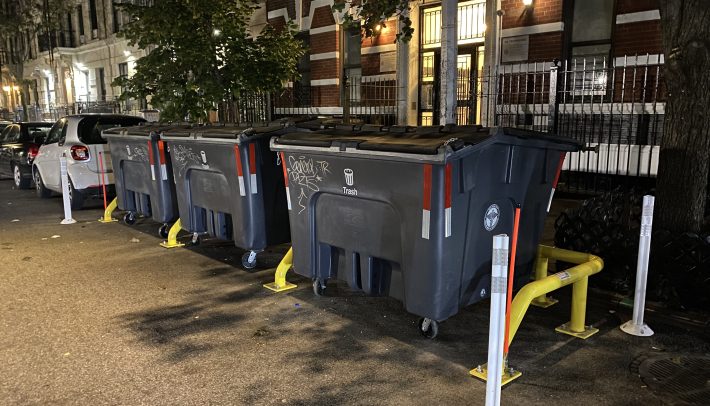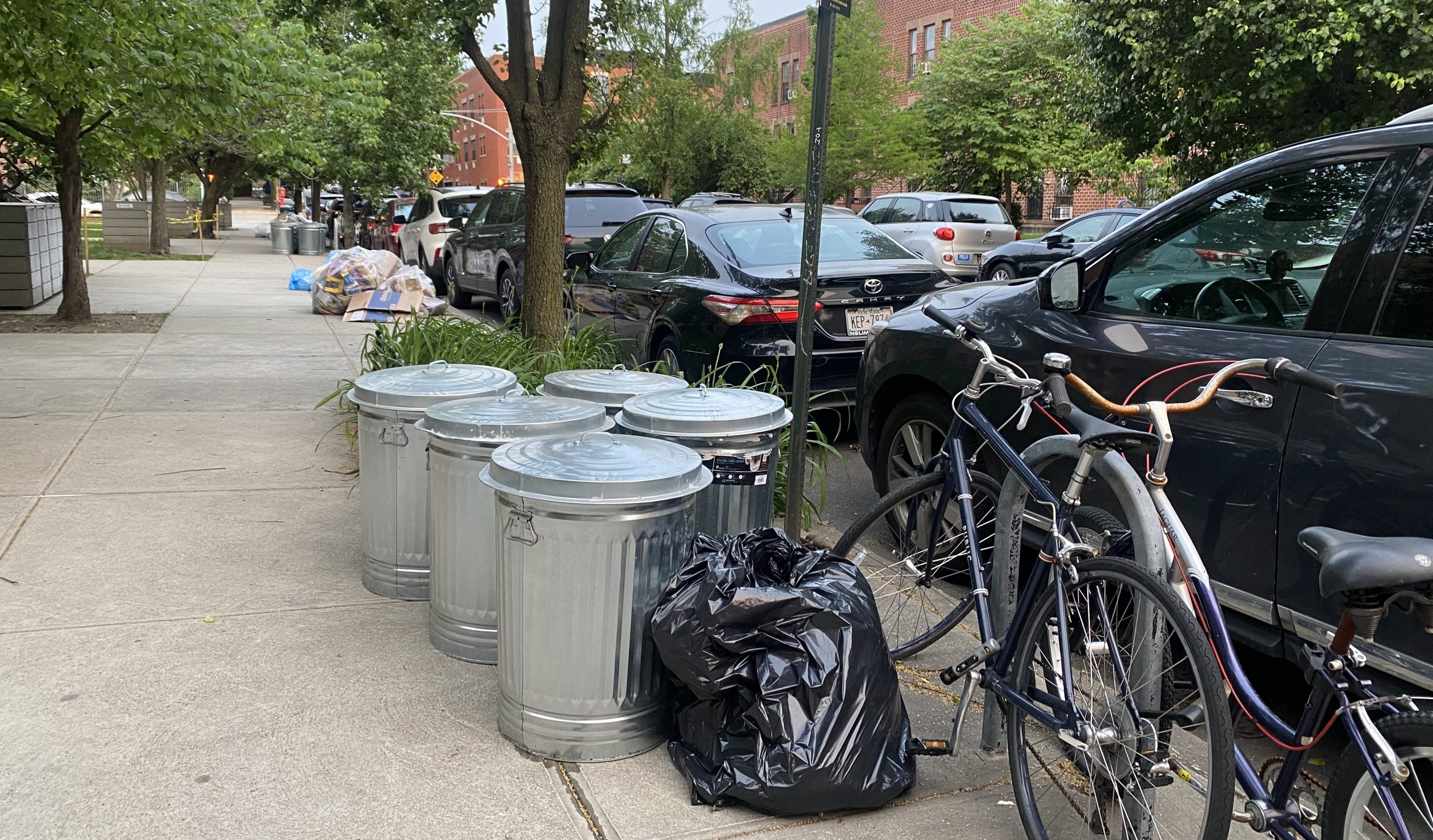The city's new trash container rules for smaller buildings threaten to clog up the sidewalk and obstruct the already scarce space for New Yorkers, especially those with disabilities, advocates warned at a hearing about the impending regulations Thursday.
Starting in a few months, residents of buildings with up to nine units will be required to put their garbage in wheeled bins on the foot path, according to the Department of Sanitation's proposed rules, a major step to rid the Big Apple of oozing heaps of rubbish bags that already occupy valuable sidewalk space while also providing a buffet for vermin.
But DSNY should move the garbage into the street rather than keep it on the sidewalk, to clear New York's already inadequate pedestrian space of further obstructions, speakers said at the hourlong feedback session for the upcoming rule change.
"New York City is well on its way to becoming bin city," said Anna Sacks, a member of the Manhattan Solid Waste Advisory Board, a citizen watchdog. "Buildings in New York City have notoriously limited unused space, so we expect that we will end up with permanently cluttered sidewalks."
That added sidewalk clutter will get in the way of New Yorkers in wheelchairs, those with visual impairments, or caregivers pushing strollers, said one advocate for people with disabilities.
"Navigating around these objects is not easy and often forces individuals into tight spaces or even onto the street, which can be dangerous," said Anna Humphrey, an organizer with the Center For Independence of the Disabled. "The presence of additional obstacles on the sidewalks makes navigating city streets even more challenging. The unexpected placement of trash bins can lead to accidents or injuries."
Nearly 20 percent of the buildings covered by the rule have a storefront on the ground floor, leaving little room for storing the containers between collections, according to an analysis of city data by the Center for Zero Waste Design.
"Given that almost half of New York City sidewalks are narrower than nine foot there simply won't be enough clear path to walk," said the Center's Executive Director Clare Miflin.
We need our trash off the sidewalks & into bins. And that's just where those bins should go - OFF the sidewalk & into the curb lane. DSNY is holding a hearing Thurs 8/8 @ 9:30AM. Testify or comment to urge we use the curb!
— Open Plans (@OpenPlans) August 7, 2024
Info & talking points: https://t.co/YI9npQ2Dk0 pic.twitter.com/GSj4SyHzHD
DSNY unveiled its new rules last fall, and they are set to kick in on Nov. 12. Residents can use containers with tight-fitting lids of their choice at first, but will have to switch them out for new city-issued wheelie bins come June 2026.
Building owners can request a temporary waiver if the bins would cause a "public safety hazard for pedestrians," or "unreasonable hardship," according to the rules, but that exception ends once DSNY provides a workable containerization solution for them.
It's all part of what DSNY calls its "trash revolution," to follow other global cities and collect trash from containers instead of bags dumped on the sidewalk. The agency laid out its ambitious blueprint last year. The city also began requiring all commercial trash go in bins starting last March.
The largest buildings — of 31 or more apartments — will eventually have to use stationary, European-style bins in the street, which would repurpose up to 69,000 parking spaces citywide — a mere 2 percent of the roughly 3,000,000 car storage spots that the city largely gives away to drivers for free.
Buildings between 10-30 units can opt for the bigger street bins or the smaller wheelie bins on the sidewalk.
DSNY began a pilot with shared street containers on wheels with retrofitted rear-loader collection trucks along 10 blocks in West Harlem last year. The agency will test stationary containers in the uptown neighborhood next year with all new side-loading trucks to lift the enclosures.

Sanitation officials this week contracted a Spanish firm for the new stationary bins that will be headed uptown, Crain's reported.
Each street container will be locked and assigned to a building, unlike the current pilot containers which are open and shared.
The agency is moving away from shared model because that will prevent businesses from illegally dumping their waste in them to avoid collection fees and make it clear which property owner is responsible for keeping the area around the boxes clean, said Sanitation spokesman Joshua Goodman, who defended DSNY's proposal of also allowing bins on the sidewalk.
"I understand some people support a different model. The model we are pursuing – which will FINALLY defeat the black bags once and for all, and take back our public space – was developed after very substantial volumetric research and analysis and review of global best practices. It is the model that will actually work in New York City," Goodman wrote in an email.
New garbage truck pic.twitter.com/VWERBEe6u1
— Kevin Duggan (@kduggan16) February 1, 2024
Those issues aren't insurmountable said Miflin, of the Center for Zero Waste Design, who added that shared containers in the curb lane were the way to go.
The city could narrow the openings to discourage larger business waste, enforce against that illegal dumping, and keep the area clean as a public service, according to Miflin.
"Shared containers [are] more efficient, and it would be good if DSNY cleaned up around them, else we just perpetuate the inequitable conditions of dirty streets in front of under-resourced buildings," she told Streetsblog in an email. "I know that it is more common in European cities for the municipality to clean streets."






